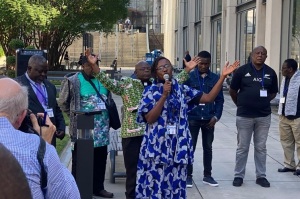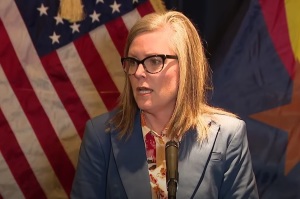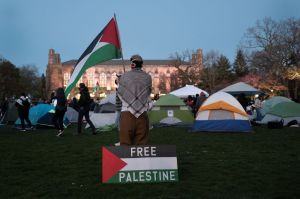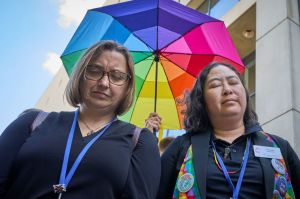Pastor Derwin Gray and CMPD Chief Kerr Putney talk race, policing
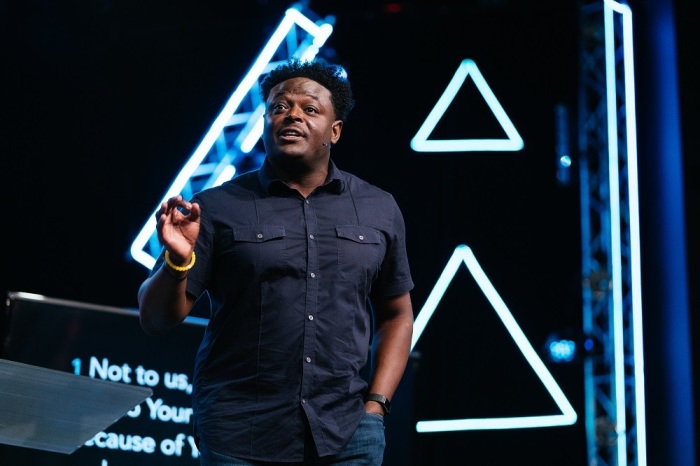
Derwin L. Gray, lead pastor of Transformation Church, had a live conversation with Charlotte-Mecklenburg Police Chief Kerr Putney on Instagram to talk about issues arising out of the death of George Floyd, a black man, while in police custody.
Gray, a former professional football player in the NFL and whose church is in South Carolina, said on Instagram live there are “systemic problems” pertaining to policing and the African American community while acknowledging that there are “many incredible men and women” in the police.
The founding pastor of Transformation Church was talking about Floyd, a 46-year-old black man, who died on May 25 while he was lying on the ground, handcuffed and restrained by three officers in Minneapolis. Several cellphone videos and police body cameras captured various aspects of the incident, which has led to ongoing protests and rioting.
Gray said black churches have historically addressed injustice.
Jesus’ commandment to “love your neighbor as yourself,” he explained, means speaking out against injustice even when it “doesn’t affect people who look like me.” He added that Jesus came for the oppressed and those held captive, both spiritually and physically, and died for all people.
The pastor asked CMPD Chief Putney if there was any part of the training that he had received that could have stopped those police officers from doing what they did.
“When I saw the video, I was disgusted; it was the most cowardly act I’ve ever seen,” Putney said, adding that the incident goes against everything that the police administration represents.
Putney also shared why he chose to become a police officer. “I grew up not liking the profession, not liking cops at all,” he said. “My dad died when I was 10, felt he was murdered; the body was thrown in the river and local authorities didn’t investigate. They chalked it up as another black man dead.”
Putney said there are many good officers who sacrifice and do great things for the community. He added that while the vetting process involves not just a background check but also screening for character flaws, it may not be perfect sometimes.
“We’re always training, trying to be better, but what you can’t train is learn from your upbringing. We train you to be good cops, but it starts with the forward; you have to be a good person,” Putney said. “Anybody willing to abuse somebody the way this former officer did was not worthy to be sworn in, in the first place.
“We keep doing all of this work, and yet, the behavior of one person, basically going rogue, puts us all in jeopardy.”
The city police chief said one of the reasons he became a police officer was to help change the system. But incidents like the death of Floyd make it difficult for communities to trust police officers.
“It doesn’t help the trust. It hinders it. You’re starting from scratch every time … When you come into this line of work to change things and you have people who do things that I think are counter to everything you want to do, it’s hard not to be frustrating and it’s tiring,” he said.
One bystander cellphone video taken at the scene on May 25 shows former police officer Derek Chauvin kneeling on Floyd’s neck for several minutes as two other officers hold on to his torso and legs. According to details listed chronologically in the criminal complaint against Chauvin, Floyd had refused to get into the police squad car, “stiffened up, fell to the ground, and told the officers he was claustrophobic.”
Though Floyd repeatedly said he couldn't breathe, Chauvin continued to keep his knee on his neck even after he became unresponsive. He was pronounced dead 90 minutes later at Hennepin County Medical Center.
Floyd, who had moved to Minnesota to start a new life following several incarcerations and a felony conviction for aggravated robbery with a deadly weapon in Texas, had been arrested for allegedly using a counterfeit $20 bill at Cup Foods convenience store to purchase cigarettes. The clerk had called 911 to report the crime and said Floyd was intoxicated.
Protests over police brutality spread nationwide since the day after his death and continued through this past weekend.
Last week, prosecutors upgraded charges against Chauvin to second-degree murder. Three other officers — Thomas Lane, J.A. Kueng and Tou Thoa — have been charged with aiding and abetting in Floyd’s death. All four officers were fired from the department days after the incident.
On Friday, Vice President Mike Pence joined Bishop Harry Jackson for a listening session with community and faith leaders, where he said the church is the right place to address the nation's response to the death of Floyd and the protests over racism that followed.
“I couldn’t help but feel that as our nation reels from the tragic death of George Floyd, that a place to start a conversation is a place of worship,” Pence said at the listening session held at Hope Christian Church in Beltsville, Maryland, where Jackson is a senior pastor.
“It’s the wellspring of our nation's strength,” Pence continued, speaking to a select group of black and minority leaders representing churches, businesses, educational institutions, and nonprofit organizations. “It’s been the wellspring of our national unity and our steady march toward a more perfect union.”
















